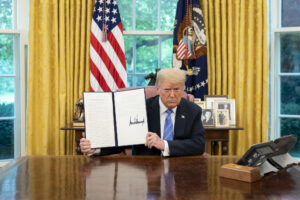It is at such a low noise that maybe you did not notice it. It is at low noise, but for the first time since the fury around the Maastricht agreement had inhibited the Europhiles and emboldened the Europhobes so much – that is, for the first time in three decades we no longer speak of “Europe” to say it is impotent and busy grading cucumbers, but to say that it is stretching, breathing and asserting itself.
Brexit itself is no longer the undeniable sign that the Union is falling apart. “Brexit? We shall see!” – we now say, deploring this rupture which the British themselves would no longer wish for today, “Brexit, too bad, it is their fault”, and not that of the 27 who …
“This time, hats off” – we can read and hear from all sides, because the Union ends the year in style. It seemed trapped by the Hungarian and Polish regimes, which were blocking its budget and recovery plan to prevent the common funding from finally being made conditional on respect for the rule of law. When it came the time to take that all-important step, the EU was about to stumble in the carpet, but no!
While France and the Commission were threatening to turn the recovery plan into a reinforced cooperation or an intergovernmental agreement from which Budapest and Warsaw would have excluded themselves, Mrs Merkel offered Viktor Orban and the Polish right wing the means to save face. They were formally assured, in black and white, that this new link between respect for the rule of law and the payment of European funds could not be used to impose on them political choices of which the member states are naturally in charge. At the same time, it was confirmed that all states, and therefore themselves, could of course appeal to the European Court of Justice if the wording of these provisions seemed questionable to them.
They have been thus granted rights that they already had under the treaties, but the cleverness was to allow them to claim victory and to make the appeal to the Court of Justice suspensive so that Mr Orbán could go to the 2022 legislative elections before conditionality became a reality and the Commission opened the files on corruption in Hungary.
This is called a compromise and it is an excellent one. The Union has not changed one comma in its new provisions. The Hungarian and Polish regimes have avoided the humiliation of too stinging a defeat and, with no crisis at all, no blocked budget or recovery plan, it is now a fact that there will be no more European solidarity without respect for the rule of law.
This would be enough to sound a “Merry Christmas!” to Europeans, but in 2020 the Union did not stop there. With the adoption of its Green Deal and its decision to reduce its greenhouse gas emissions even further, the European Union has finally established itself as the world’s driving force in the fight against global warming. By putting a proposal for a joint transatlantic programme on the table before the Americans did, it confirmed its completely new determination to become a player on the international stage.
By deciding to jointly borrow 750 billion euros to finance a common recovery plan, it has finally decided to break two heavy and unnecessarily paralysing taboos at once. By suspending, sine die, the application of its budget deficit and debt ceilings, it will have been the first, followed soon by the United States, to turn its back on the forty years of Thatcherism which, from Orban to Trump, had paved the way for the new political extreme right. By taking charge of vaccine purchases on behalf of the 27, it added health policy to its areas of competence without going through a modification of the treaties, and what is more: without anyone being offended by it. Last but not least, by laying the foundations for regulating cyberspace, forcing its major platforms to comply with European laws, it has taken the lead in putting in order a new world behaving outside the law.
By doing all this in less than a year, it will have entered, so to speak, into the third phase of European unity: political unity, after the Common Market and the single currency. So yes, waiting for all the difficulties of 2021 to come, Merry Christmas to all!



